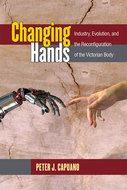UPDATE: Changing Hands has been shortlisted for the British Society for Literature and Science Book Prize! The winner will be announced at the annual Conference in Birmingham from 7th-9th April. For more information, visit https://www.bsls.ac.uk/2016/02/bsls-2016-book-prize-shortlist/
In Changing Hands, Peter J. Capuano sifts through Victorian literature and culture for changes in the way the human body is imagined in the face of urgent questions about creation, labor, gender, class, and racial categorization, using “hands” (the “distinguishing mark of . . . humanity”) as the primary point of reference. Capuano complicates his study by situating the historical argument in the context of questions about the disappearance of hands during the twentieth century into the haze of figurative meaning. Out of this curious aporia, Capuano exposes a powerful, “embodied handedness” as the historical basis for many of the uncritically metaphoric, metonymic, and/or ideogrammatic approaches to the study of the human body in recent critical discourse.
“Changing Hands is a major contribution to Victorian studies, revealing the human hand as a fascinating nexus for the scientific, industrial, religious, and social upheavals of the age. Capuano’s provocative examples and arguments freshly illuminate the whole landscape of nineteenth-century writing: this is a manual for our critical moment.”
—Andrew Stauffer, University of Virginia
“Changing Hands offers a revelatory account of the impact of industrialism and evolutionary discourse on conceptions of human agency and identity, which Peter Capuano brilliantly elicits from figurations of the human hand. In capturing the pervasive importance of a trope long hidden in plain sight, Capuano transfigures a broad range of nineteenth-century reflection.” —James Eli Adams, Columbia University
Available through University of Michigan Press
